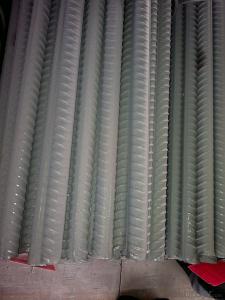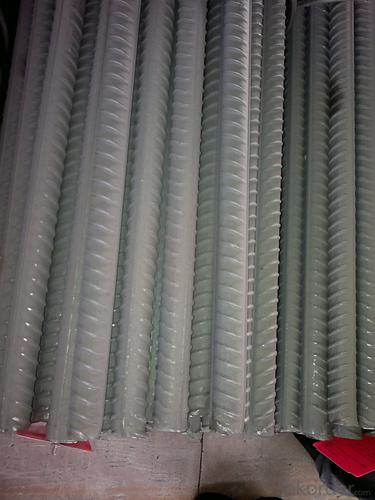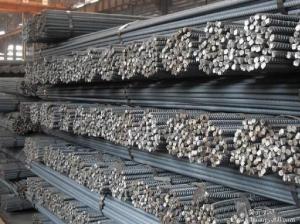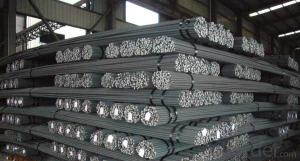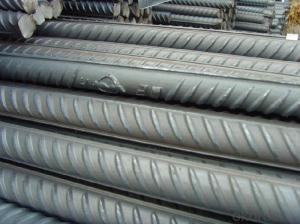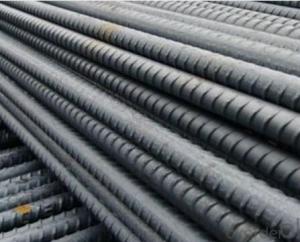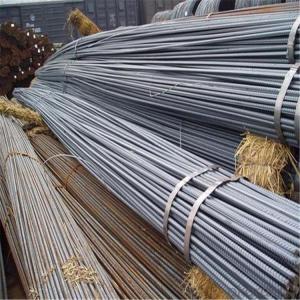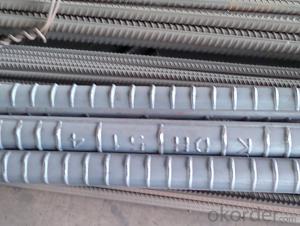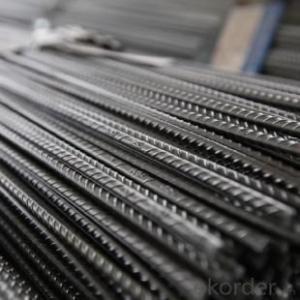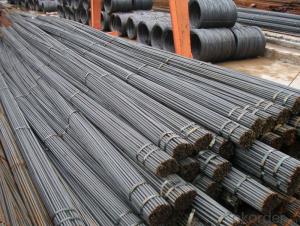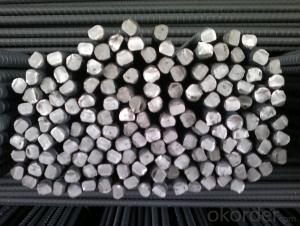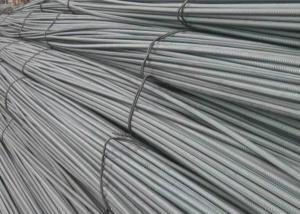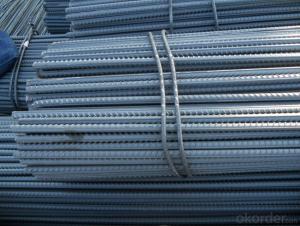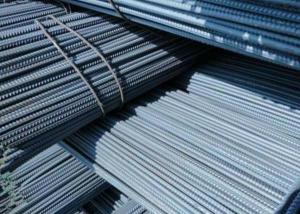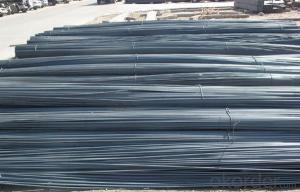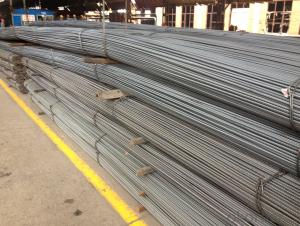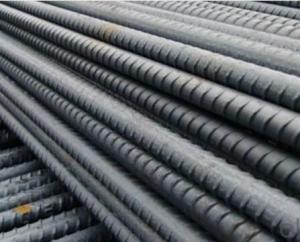GB Standard Deformed Steel Rebars HRB335, HRB400, HRB500
- Loading Port:
- Shanghai
- Payment Terms:
- TT or LC
- Min Order Qty:
- 25 m.t.
- Supply Capability:
- 200000 m.t./month
OKorder Service Pledge
OKorder Financial Service
You Might Also Like
Product Description:
OKorder is offering GB Standard Deformed Steel Rebars HRB335, HRB400, HRB500 at great prices with worldwide shipping. Our supplier is a world-class manufacturer of steel, with our products utilized the world over. OKorder annually supplies products to European, North American and Asian markets. We provide quotations within 24 hours of receiving an inquiry and guarantee competitive prices.
Product Applications:
GB Standard Deformed Steel Rebars HRB335, HRB400, HRB500 are ideal for structural applications and are widely used in the construction of buildings and bridges, and the manufacturing, petrochemical, and transportation industries. Deformed bar is widely used in buildings, bridges, roads and other engineering construction. Big to highways, railways, bridges, culverts, tunnels, public facilities such as flood control, dam, small to housing construction, beam, column, wall and the foundation of the plate, deformed bar is an integral structure material.
Product Advantages:
GB Standard Deformed Steel Rebars HRB335, HRB400, HRB500 are durable, strong, and resist corrosion.
Main Product Features:
· Premium quality
· Prompt delivery & seaworthy packing (30 days after receiving deposit)
· Corrosion resistance
· Can be recycled and reused
· Mill test certification
· Professional Service
· Competitive pricing
Specifications of GB Standard Deformed Steel Rebars HRB335, HRB400, HRB500
Standard | GB UK USA | HRB335 HRB400 HRB500 G460B, B500A, B500B,B500C GR40, GR60 | |
Diameter | 6mm,8mm,10mm,12mm,14mm,16mm,18mm,20mm, 22mm,25mm,28mm,32mm,36mm,40mm,50mm | ||
Length | 6M, 9M,12M or as required | ||
Payment term | TT or L/C | ||
Trade terms | FOB, CFR, CIF | ||
Application | Building, construction | ||
Each bundle weight | 2-3MT, or as required | ||
Type | Hot rolled steel rebar | ||
Brand name | OKORDER | ||
Theoretical weight and section area of each diameter as below for your information:
Diameter(mm) | Section area (mm²) | Mass(kg/m) | Weight of 12m (kg) | Pcs/ton |
6 | 28.27 | 0.222 | 2.664 | 375.38 |
8 | 50.27 | 0.395 | 4.74 | 210.97 |
10 | 78.54 | 0.617 | 7.404 | 135.06 |
12 | 113.1 | 0.888 | 10.656 | 93.84 |
14 | 153.9 | 1.21 | 14.52 | 68.87 |
16 | 201.1 | 1.58 | 18.96 | 52.74 |
18 | 254.5 | 2.00 | 24 | 41.67 |
20 | 314.2 | 2.47 | 29.64 | 33.74 |
22 | 380.1 | 2.98 | 35.76 | 27.96 |
25 | 490.9 | 3.85 | 46.2 | 21.65 |
28 | 615.8 | 4.83 | 57.96 | 17.25 |
32 | 804.2 | 6.31 | 75.72 | 13.21 |
36 | 1018 | 7.99 | 98.88 | 10.43 |
40 | 1257 | 9.87 | 118.44 | 8.44 |
50 | 1964 | 15.42 | 185.04 | 5.40 |
Deformed Steel Rebar in warehouse
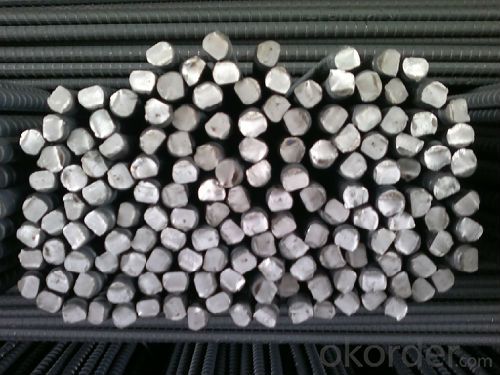
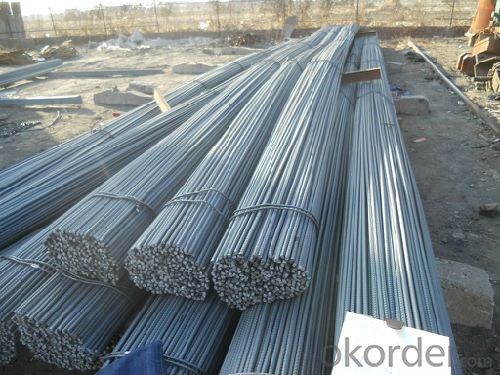
Packaging & Delivery of GB Standard Deformed Steel Rebars HRB335, HRB400, HRB500
Packaging Detail: products are packed in bundle and then shipped by container or bulk vessel, deformed bar is usually naked strapping delivery, when storing, please pay attention to moisture proof. The performance of rust will produce adverse effect.
Delivery Detail: within 45 days after received advanced payment or LC.
Label: to be specified by customer, generally, each bundle has 1-2 labels
Note:
1. Our products are produced according to national standard (GB), if not, supply according to national standards (GB) or agreement as customer required.
2. Other Grade and Standard Deformed Steel Bar we can supply:
Grade: GR40/GR60, G460B/B500A/B500B/B500C,BST500S
Standard: ASTM, BS, DIN
The Minimum Order Quantity of these products is high, and need to be confirmed.
3. We can not only supply Deformed Steel Bar; if you need anything about building materials, please contact us for further information.
4. Please send us your detail specifications when inquire. We will reply to you as soon as possible. We sincerely hope we can establish a long stable business relationship.
FAQ:
Q1: What is the normal tolerance of GB Standard Deformed Steel Rebars HRB335, HRB400, HRB500?
A2: Normally 3%-5%, but we can also produce the goods according to the customers' requests.
Q2: How do we guarantee the quality of GB Standard Deformed Steel Rebars HRB335, HRB400, HRB500?
A2: We have established an advanced quality management system which conducts strict quality tests at every step, from raw materials to the final product. At the same time, we provide extensive follow-up service assurances as required.
Q3: How soon can we receive the product after purchase?
A3: Within three days of placing an order, we will begin production. The specific shipping date is dependent upon international and government factors, but is typically 7 to 10 workdays.
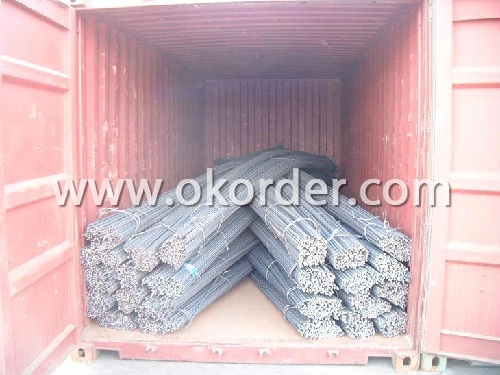
Deformed Steel Bar in factory
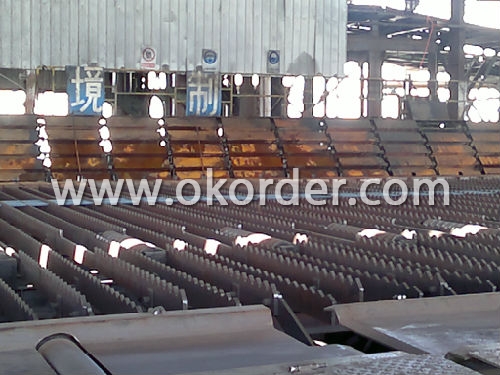
- Q: What is the national standard of thread steel No. 8?
- Steel is known as hot rolled ribbed bar. The rebar is a kind of small section steel, mainly used for the skeleton of reinforced concrete construction members. In use, some mechanical strength, bending deformation property and welding performance are required.
- Q: Can steel rebars be used in underground construction projects?
- Indeed, steel rebars have the ability to be utilized in underground construction endeavors. In fact, rebars are commonly employed in a wide array of construction projects, including those involving subterranean structures. The primary purpose of steel rebars is to fortify concrete and furnish the structure with added strength and stability. In underground construction specifically, rebars are frequently employed in the creation of foundations, walls, and columns to fortify the concrete and guarantee the integrity of the structure. By incorporating steel rebars into underground construction projects, the load-bearing capacity of the concrete is significantly enhanced, rendering it more impervious to the pressure and forces exerted by the surrounding soil and groundwater. Furthermore, steel rebars possess exceptional durability and corrosion resistance, thus rendering them appropriate for subterranean environments where they may be exposed to moisture and other potentially harmful elements. In sum, the inclusion of steel rebars in underground construction endeavors is absolutely vital in order to ensure the structural stability and longevity of these below-ground structures.
- Q: Can steel rebars be used in tunnel construction?
- Yes, steel rebars can be used in tunnel construction. They are commonly used to reinforce concrete structures, including tunnel linings, to provide strength and stability to the tunnel. The rebars are embedded within the concrete to enhance its load-bearing capacity and resist the forces exerted on the tunnel walls.
- Q: Are steel rebars easy to handle and transport?
- Steel rebars are generally easy to handle and transport due to their relatively lightweight and compact nature. The smaller sizes of rebars, such as those commonly used in construction, can be easily lifted by workers without the need for heavy machinery. Additionally, their straight and elongated shape allows for convenient stacking and bundling, making them easier to store and transport. Furthermore, steel rebars can be easily cut and bent on-site using simple tools, which adds to their ease of handling during construction projects. However, it is important to note that larger and heavier rebars may require special equipment or machinery for handling and transportation to ensure safety and efficiency.
- Q: Are steel rebars suitable for reinforcement in tunnels?
- Yes, steel rebars are suitable for reinforcement in tunnels. Steel rebars provide excellent strength and durability, making them an ideal choice for reinforcing tunnels and ensuring their structural integrity. They can effectively withstand the loads and pressures that tunnels may experience, including the weight of the surrounding soil or rock, as well as any dynamic forces. Additionally, steel rebars have good resistance to corrosion, further enhancing their suitability for tunnel reinforcement.
- Q: Are there any special requirements for handling and storing steel rebars on construction sites?
- Yes, there are special requirements for handling and storing steel rebars on construction sites. It is important to ensure that rebars are stored in a designated area that is clean, dry, and protected from moisture, dirt, and other contaminants. They should be stored in a horizontal position and stacked in a way that prevents damage or deformation. Additionally, rebars should be handled with care to avoid any bending, twisting, or dropping, as these can compromise their structural integrity. It is crucial to follow safety guidelines and use appropriate lifting and handling equipment to prevent accidents or injuries during the transportation and installation of rebars.
- Q: How are steel rebars tested for quality assurance?
- Steel rebars are tested for quality assurance through a series of rigorous procedures. These include visual inspection, dimensional checks, and mechanical testing. Visual inspection ensures that the rebars are free from any visual defects or surface irregularities. Dimensional checks are performed to verify the rebars' weight, diameter, and length, ensuring they meet the required specifications. Mechanical testing involves conducting tensile and bend tests to assess the rebars' strength, ductility, and flexibility. These quality assurance tests ensure that steel rebars meet the necessary standards and are fit for use in construction projects.
- Q: Are steel rebars suitable for use in wastewater treatment plants?
- Yes, steel rebars are suitable for use in wastewater treatment plants. They provide excellent strength and durability, making them ideal for reinforcing concrete structures in such environments. Additionally, steel rebars are corrosion-resistant, which is crucial in wastewater treatment plants where exposure to chemicals and moisture is common.
- Q: Are steel rebars resistant to earthquakes?
- Yes, steel rebars are highly resistant to earthquakes. The use of steel reinforcement in concrete structures helps to improve their structural integrity and ability to withstand seismic forces. Steel rebars enhance the strength and flexibility of the concrete, making it more capable of absorbing and dissipating the energy generated during an earthquake.
- Q: What is the process of galvanizing steel rebars?
- The process of galvanizing steel rebars involves the application of a layer of zinc to the surface of the rebar in order to prevent corrosion and prolong its lifespan. The process typically consists of the following steps: 1. Surface Preparation: The steel rebars are cleaned thoroughly to eliminate any dirt, oil, or scale from the surface. This is typically achieved through the use of chemical cleaning agents and mechanical methods, such as sandblasting or shot blasting. 2. Pickling: Once cleaned, the rebars are submerged in a pickling solution, usually a mixture of hydrochloric acid and water. This solution eliminates any remaining impurities or oxides from the surface of the rebars. 3. Fluxing: The pickled rebars are then rinsed to eliminate any residual acid and are immersed in a flux solution. The flux solution aids in the removal of any remaining oxides and ensures proper adhesion of the zinc coating. 4. Galvanizing: The fluxed rebars are then dipped into a molten zinc bath. The temperature of the zinc bath is typically kept between 815 to 850 degrees Fahrenheit (435 to 455 degrees Celsius). The rebars are carefully immersed and then slowly withdrawn to allow excess zinc to drain off. 5. Quenching: After the galvanizing process, the rebars may be rapidly cooled in a specialized solution to stabilize the zinc coating. This step helps to prevent the excessive formation of zinc oxide on the surface. 6. Inspection: Once the galvanized rebars have cooled down, they undergo a comprehensive inspection to ensure the quality of the coating. Visual inspection, thickness measurement, and adhesion tests are commonly conducted to assess the integrity of the zinc coating. Overall, the galvanizing process provides a robust and effective protective coating for steel rebars, rendering them highly resistant to corrosion and extending their lifespan in a variety of applications, including construction, reinforcement, and infrastructure projects.
Send your message to us
GB Standard Deformed Steel Rebars HRB335, HRB400, HRB500
- Loading Port:
- Shanghai
- Payment Terms:
- TT or LC
- Min Order Qty:
- 25 m.t.
- Supply Capability:
- 200000 m.t./month
OKorder Service Pledge
OKorder Financial Service
Similar products
Hot products
Hot Searches
Related keywords
